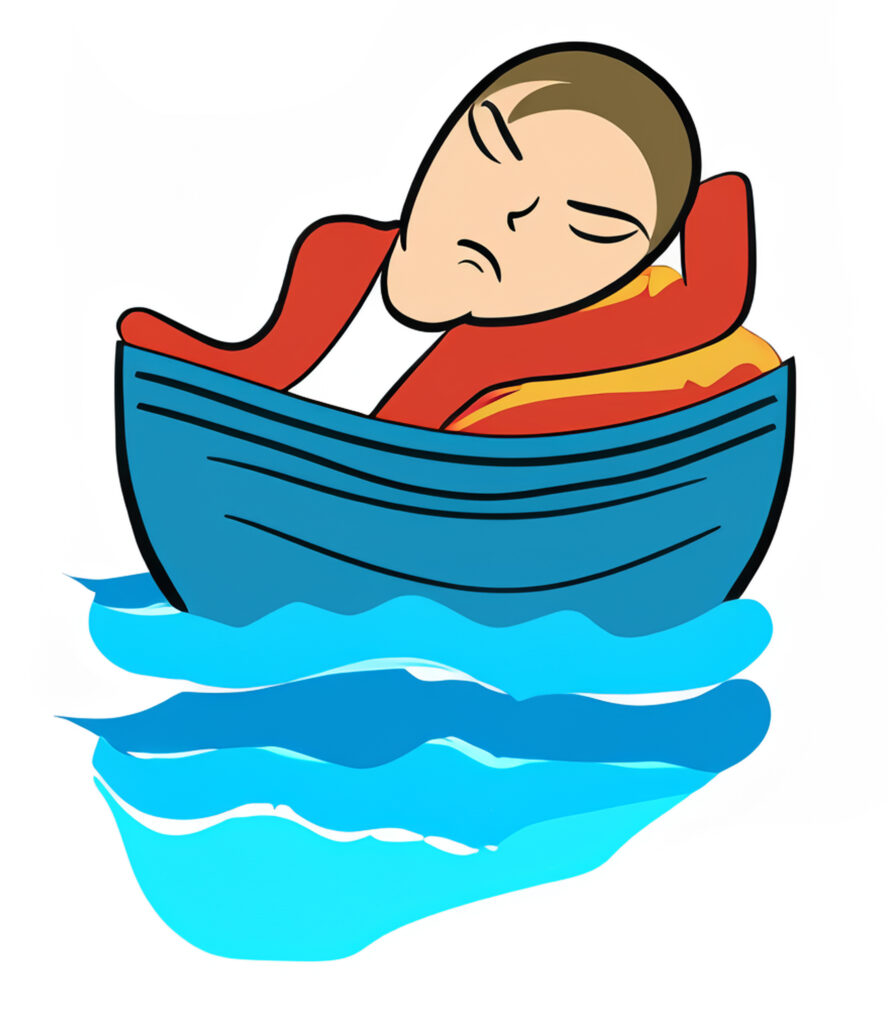Ah, sleep – that elusive state of blissful unconsciousness, where the mind embarks on its nightly odyssey, only to be rudely awakened by the siren call of an alarm clock, signaling yet another day in the tumultuous sea of academia. As a professor who once navigated these choppy waters as a student, I’ve seen firsthand the whirlpools of high workload, the maelstroms of irregular schedules, and the tempests stirred by excessive screen time. Let’s not forget the squalls of stress and anxiety, and of course, the siren’s song of caffeine and stimulants. Morbidly funny, isn’t it? How we’re essentially on a boat crafted by our own habits, trying not to sink in the very waters we navigate daily that we fill with our obligations and responsibilities.
But fear not, for I bring you a lighthouse of wisdom, a five-step comprehensive plan designed to help students and professors alike sail smoothly into the haven of restful slumber. Let’s chart the course.

Step 1: Time Management Training: Mastering the Winds
The gales of academic and work-related demands can blow the sturdiest of ships off course. Time management is your compass. Utilize popular tools like Google Calendar (https://www.google.com/calendar) and Trello (https://trello.com/) to plot your course. They’re not just platforms; they’re your navigational stars, helping you allocate time for coursework, lab work, and rest. Websites like MindTools (https://www.mindtools.com/c3vl26l/time-management) offer treasure troves of time management techniques. Remember, even the most seasoned sailors must sometimes adjust their sails.
References:
Google Calendar: A widely-used tool for scheduling and time management, facilitating the organization of both academic and personal tasks. https://www.google.com/calendar
Trello: A project management application that helps in organizing tasks and deadlines in a visually appealing and easy-to-use format. https://trello.com
MindTools – Time Management: Offers a wide range of articles and tools aimed at improving time management skills. https://www.mindtools.com/c3vl26l/time-management
Step 2: Structured Time for Course and Lab Work: Navigating the Academic Currents
Without structure, we’re adrift at sea. Establishing a routine is akin to setting a predictable current that guides your daily journey. Dedicate blocks of time for specific tasks and adhere to them as if they were the law of the land. Think of it as charting a course through dangerous waters; without it, you’re inviting the Kraken of procrastination to drag you into the abyss. MindTools (https://www.mindtools.com/ak2ljl6/effective-scheduling) provides creative ways to establish effective schedules.
References:
Effective Scheduling: Advice on creating a study schedule that balances course work, lab work, and personal time. https://www.mindtools.com/ak2ljl6/effective-scheduling
Step 3: Screen Time Awareness and Helpful Software: The Lure of the Digital Depths
The glow of screens is like the bioluminescence of deep-sea creatures; mesmerizing, but potentially hazardous. Excessive exposure to this artificial light can disrupt your circadian rhythms, luring your sleep away like a pirate stealing treasure. Tools like f.lux (https://justgetflux.com/), Apple’s Night Shift, or Android’s Night Mode reduce blue light exposure, while apps like Freedom (https://freedom.to/) help you navigate away from the time-sucking whirlpool of social media and distractions. Remember, the digital sea is vast and endless; navigate it wisely.
References:
f.lux: Software that adjusts your computer screen’s lighting to the time of day, reducing blue light exposure in the evening to help improve sleep. https://justgetflux.com
Freedom: An app designed to block distracting websites and apps across all your devices to help increase productivity and reduce screen time. https://freedom.to
Step 4: Relaxation Techniques and Support Networks: The Calm Before the Storm
Stress and anxiety are the storms that batter our minds, making tranquil harbors of sleep seem leagues away. Techniques such as mindfulness meditation, deep breathing exercises, or yoga can be your anchors, grounding you amidst the tempest. Platforms like Headspace (https://www.headspace.com/) or Calm (https://www.calm.com/) are your mates in this journey, offering guidance through the stormy weather. And never sail alone; build a crew of support in the form of friends, family, or counseling services. Together, you can weather any storm.
References:
Headspace: Offers guided meditations and mindfulness practices to reduce stress and improve sleep. https://www.headspace.com
Calm: Another popular app for meditation, sleep stories, and relaxation techniques. https://www.calm.com
Step 5: Caffeine and Stimulant Education: Navigating Away from the Sirens
Ah, the siren’s call of caffeine and stimulants, promising to guide you through all-nighters and deadlines. But heed this tale; too much reliance on these potions can lead you into treacherous waters, where restful harbors are but a distant dream. Educate yourself on their effects with resources from reputable sites like Mayo Clinic (https://www.mayoclinic.org/healthy-lifestyle/nutrition-and-healthy-eating/in-depth/caffeine/art-20045678) or Healthline (https://www.healthline.com/health/caffeine-effects-on-body). Learn to sip the waters of moderation, and find natural ways to boost your energy, like exercise or a balanced diet. Remember, the goal is to sail smoothly, not to race to the point of exhaustion.
References:
Mayo Clinic – Caffeine: How much is too much?: Provides evidence-based guidelines on caffeine consumption and its effects. https://www.mayoclinic.org/healthy-lifestyle/nutrition-and-healthy-eating/in-depth/caffeine/art-20045678
Healthline – The Effects of Caffeine on Your Body: Offers a comprehensive overview of how caffeine affects various aspects of health. https://www.healthline.com/health/caffeine-effects-on-body
The goal of this little guide:
In crafting this guide, I cast a bottle (I promise that this will be the last set of water-based lubricants I will use for your minds) into the vast ocean of the internet, hoping it reaches those navigating the same treacherous waters I once did. With a blend of humor and wisdom, my aim is to guide you to the serene shores of Sleep’s Kingdom. Follow these stars, and may your journey through academia be as restful as it is enlightening. Remember, the goal isn’t to battle the sea, but to learn to sail it with finesse.
So, here’s to navigating the sleepless seas of academia with a bit more wisdom and a lot more sleep. May your nights be as productive as your days, and may your dreams be filled with the sweet success of academic and personal achievement. Sail on, brave voyagers, for the dawn of restful slumber is just over the horizon.
